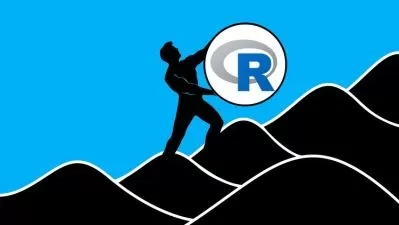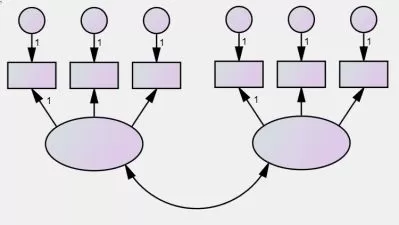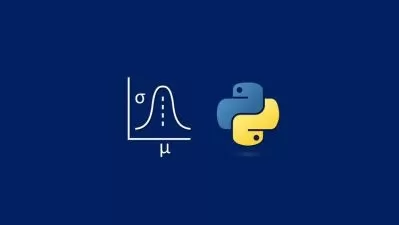Applied Statistics Real World Problem Solving
Akhil Vydyula
3:02:09
Description
Applied Statistics Real World Problem Solving
What You'll Learn?
- Understand and differentiate data types in statistics: Gain a comprehensive understanding of various data types and their applications in business statistics.
- Apply measures of central tendency and dispersion: Learn how to calculate and interpret mean, median, mode, standard deviation, and more.
- Perform hypothesis testing and confidence intervals: Master the skills needed to conduct hypothesis tests and calculate confidence intervals using real-world da
- Analyze relationships between variables: Develop the ability to use correlation coefficients, scatter plots, and advanced statistical techniques to identify and
Who is this for?
What You Need to Know?
More details
DescriptionApplied Statistics: Real World Problem Solving is a comprehensive course designed to equip you with the statistical tools and techniques needed to analyze real-world data and make informed decisions. Whether you're a business analyst, data scientist, or simply looking to enhance your data analysis skills, this course will provide you with a solid foundation in applied statistics.
Key Topics Covered:
Introduction to Business Statistics: Understand the basics of data types and their relevance in business, along with the differences between quantitative and qualitative data.
Measures of Central Tendency: Learn about mean, median, and mode, and their importance in summarizing data.
Measures of Dispersion: Explore standard deviation, mean deviation, and quantile deviation to understand data variability.
Distributions and the Central Limit Theorem: Dive into different types of distributions and grasp the central limit theorem's significance.
Sampling and Z-Scores: Understand the concepts of sampling from a uniform distribution and calculating Z-scores.
Hypothesis Testing: Learn about p-values, hypothesis testing, t-tests, confidence intervals, and ANOVA.
Correlation: Study the Pearson correlation coefficient and its advantages and challenges.
Advanced Statistical Concepts: Differentiate between correlation and causation, and perform in-depth hypothesis testing.
Data Cleaning and Preprocessing: Master techniques for cleaning and preprocessing data, along with plotting histograms and detecting outliers.
Statistical Analysis and Visualization: Summarize data with summary statistics, visualize relationships between variables using pair plots, and handle high correlations using heat maps.
What You'll Gain:
Practical Skills: Apply statistical techniques to real-world problems, making data-driven decisions in your professional field.
Advanced Understanding: Develop a deep understanding of statistical concepts, from basic measures of central tendency to advanced hypothesis testing.
Hands-On Experience: Engage in practical exercises and projects to solidify your knowledge and gain hands-on experience.
Who This Course Is For:
Business Analysts: Looking to enhance their data analysis skills.
Data Scientists: Seeking to apply statistical techniques to solve complex problems.
Students and Professionals: Interested in mastering applied statistics for career advancement.
Prerequisites:
Basic Understanding of Mathematics: No prior programming experience needed.
Interest in Data Analysis: A keen interest in learning how to analyze and interpret data effectively.
By the end of this course, you will be equipped with the skills and knowledge to tackle real-world data problems using applied statistics. Enroll now and take the first step towards becoming proficient in statistical analysis!
Who this course is for:
- Business analysts: Professionals looking to enhance their data analysis skills for better decision-making.
- Students and professionals: Those interested in mastering applied statistics for career advancement.
- Researchers: Academics and researchers needing to apply statistical methods to their work for accurate results.
- Data scientists: Individuals seeking to apply statistical techniques to solve complex problems.
Applied Statistics: Real World Problem Solving is a comprehensive course designed to equip you with the statistical tools and techniques needed to analyze real-world data and make informed decisions. Whether you're a business analyst, data scientist, or simply looking to enhance your data analysis skills, this course will provide you with a solid foundation in applied statistics.
Key Topics Covered:
Introduction to Business Statistics: Understand the basics of data types and their relevance in business, along with the differences between quantitative and qualitative data.
Measures of Central Tendency: Learn about mean, median, and mode, and their importance in summarizing data.
Measures of Dispersion: Explore standard deviation, mean deviation, and quantile deviation to understand data variability.
Distributions and the Central Limit Theorem: Dive into different types of distributions and grasp the central limit theorem's significance.
Sampling and Z-Scores: Understand the concepts of sampling from a uniform distribution and calculating Z-scores.
Hypothesis Testing: Learn about p-values, hypothesis testing, t-tests, confidence intervals, and ANOVA.
Correlation: Study the Pearson correlation coefficient and its advantages and challenges.
Advanced Statistical Concepts: Differentiate between correlation and causation, and perform in-depth hypothesis testing.
Data Cleaning and Preprocessing: Master techniques for cleaning and preprocessing data, along with plotting histograms and detecting outliers.
Statistical Analysis and Visualization: Summarize data with summary statistics, visualize relationships between variables using pair plots, and handle high correlations using heat maps.
What You'll Gain:
Practical Skills: Apply statistical techniques to real-world problems, making data-driven decisions in your professional field.
Advanced Understanding: Develop a deep understanding of statistical concepts, from basic measures of central tendency to advanced hypothesis testing.
Hands-On Experience: Engage in practical exercises and projects to solidify your knowledge and gain hands-on experience.
Who This Course Is For:
Business Analysts: Looking to enhance their data analysis skills.
Data Scientists: Seeking to apply statistical techniques to solve complex problems.
Students and Professionals: Interested in mastering applied statistics for career advancement.
Prerequisites:
Basic Understanding of Mathematics: No prior programming experience needed.
Interest in Data Analysis: A keen interest in learning how to analyze and interpret data effectively.
By the end of this course, you will be equipped with the skills and knowledge to tackle real-world data problems using applied statistics. Enroll now and take the first step towards becoming proficient in statistical analysis!
Who this course is for:
- Business analysts: Professionals looking to enhance their data analysis skills for better decision-making.
- Students and professionals: Those interested in mastering applied statistics for career advancement.
- Researchers: Academics and researchers needing to apply statistical methods to their work for accurate results.
- Data scientists: Individuals seeking to apply statistical techniques to solve complex problems.
User Reviews
Rating
Akhil Vydyula
Instructor's Courses
Udemy
View courses Udemy- language english
- Training sessions 16
- duration 3:02:09
- Release Date 2024/10/11











